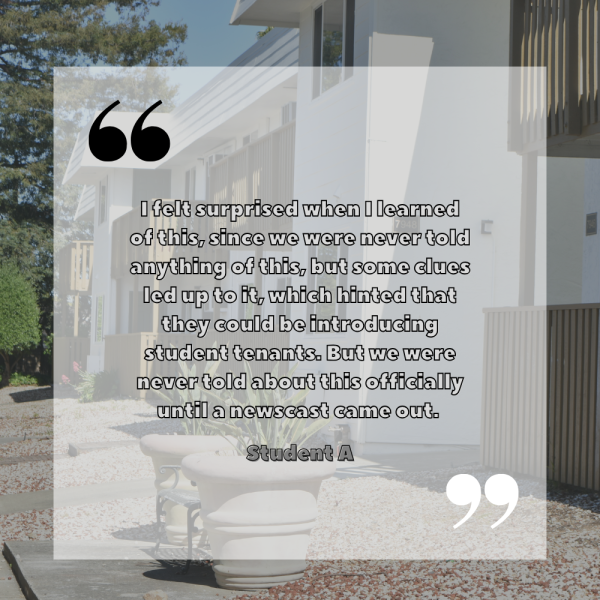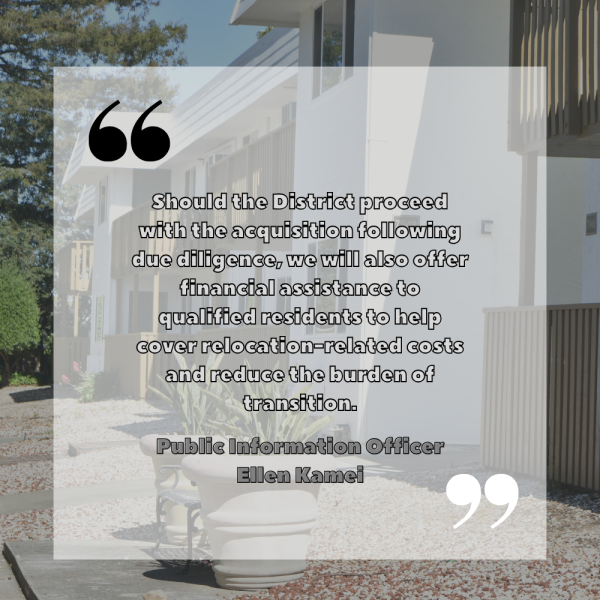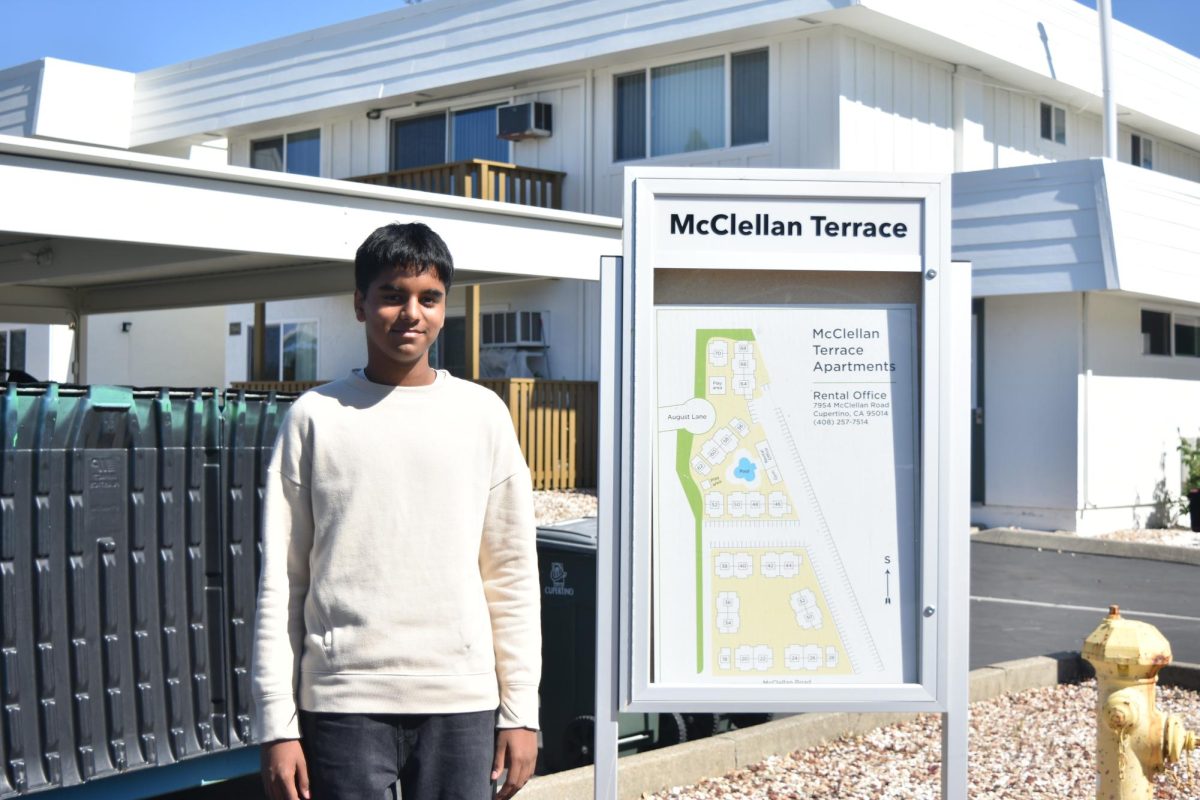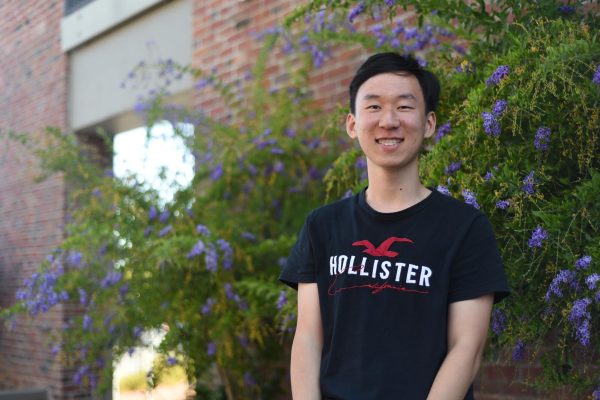The student source in this story is anonymous due to potential legal concerns in this ongoing matter and will be referred to as Student A.
Foothill-De Anza Community College (FHDA) reached a tentative deal with Prometheus Real Estate Group to buy the McClellan Terrace Apartments for student housing on Tuesday, April 29, with board members unanimously voting in favor of the decision to repurpose the current housing complex into student dormitories. Financed with an approved Measure G bond, the apartment complex sold for $65.6 million, which was passed on Mar. 20, 2020. Due to the current tenants of the McClellan Terrace Apartments almost reaching a maximum capacity of 94 households, the buyer hopes to use California Relocation Assistance Law, passed under California Prop 39, to fund any decisions concerning vacating the premises.
Under the Relocation Plan Proposal of Foothill De-Anza’s contract, FHDA promised to enlist relocation services for the current tenants to ease the transition process by studying the marketplace for affordable housing and funding any services under a budget of $30,000. With the proposal being implemented next year, current tenants are allowed to stay in their apartments until June 30, 2026, and their current leases are also extended to that termination date.
Ellen Kamei, Director of Government Affairs and Public Information Officer of FDHA, explains that the district aims to provide affordable housing within walking distance of Foothill and De Anza College, alongside benefits such as easy access to convenience stores and pharmacies. Kamei adds that Foothill and De Anza Colleges currently have no dormitories or housing complexes, which imposes challenges on low-income families.

“The decision to pursue McClellan Terrace was driven by a combination of urgent student need, practical feasibility, and long-term strategic planning aligned with our mission and Measure G obligations,” Kamei said. “And so many of the graduates of the district become nurses, teachers, community leaders and workers, so we wanted to ensure that we could remove the barrier for them when it comes to housing instability.”
However, to current tenants of the apartment, such as Student A, transitioning from their current residence and its potential implications has been tough. Learning of these changes through local news outlets, Student A comments that the decision was shocking to the community currently in the apartments. Despite Student A acknowledging that the decision and outcome were fair to the tenants from FHDA’s perspective, he feels that the already tight-knit community will be disrupted.
“I felt surprised when I learned of this, since we were never told anything of this, but some clues led up to it, such as wanting to transform the main clubhouse into a gym, which hinted that they could be introducing student tenants,” Student A said. “But we were never told about this officially until a newscast came out.”
According to Student A, no real efforts have been made yet to help tenants transition into new housing complexes, which has led to several heated FHDA board meetings. Currently, both the FHDA and current tenants frequently attend city council meetings to discuss this upcoming issue.
Sophomore Harshith Nelluri, another current resident of the complex, agrees with Student A and has similarly filed petitions on the matter. Nelluri, with others, has since been rallying a petition, arguing that the deals have been unfair to the tenants. He notes that his personal eviction process has been similar to that of Student A’s — filled with uncertainties, with no formal notice given. After the lease’s termination, Nelluri’s family may move to another apartment and district, severing their ties with the MVHS community.
“They would be kicking us out within a year, so halfway through my junior year, I’m going to have to restart my life,” Nelluri said. “I’m gonna have to make new friends. I have to restart my grades and my social life.”
 While Kamei, in a written response after the initial interview, agreed that moving residents would be exposed to a certain level of stress and instability, she still feels that the district has taken the 94 families’ situations into consideration.
While Kamei, in a written response after the initial interview, agreed that moving residents would be exposed to a certain level of stress and instability, she still feels that the district has taken the 94 families’ situations into consideration.
“The District is working with a professional relocation services firm to provide personalized support to each household,” Kamei said. “This includes assistance in identifying comparable housing, help with the logistics of moving, and ongoing communication throughout the process. Should the District proceed with the acquisition following due diligence, we will also offer financial assistance to qualified residents to help cover relocation-related costs and reduce the burden of transition.”
However, Student A and Nelluri still express their disapproval and disappointment at the current situation, believing that although their education won’t be impacted, other families who have younger children will, as they’ll miss out on the education here at MVHS.
“We moved from Sunnyvale here for education, because that’s what almost every parent wants, they want education here,” Student A said. “ We were able to fight off another year, which is the best for my generation, as I’m still able to finish 11th grade, I can move somewhere else, graduate with all of my credits, everything that’s required. It’s more about looking out for the future generations, people that are maybe in ninth grade right now and will be leaving the middle of high school, which is a problem — it’s unjust in the eyes of the civilians.”












